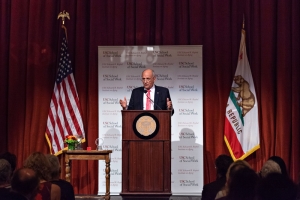America Can Be Healthier by Addressing Poverty and Promoting Prevention, Says Former U.S. Surgeon General
February 29, 2016 / by Vincent Lim- Opinion
Growing up in poverty in New York City prepared Richard Carmona for an unexpected role later in his life.
“I never planned to be surgeon general of the United States, but the best training I had was to grow up as a poor kid,” said Carmona, the 17th surgeon general of the United States, who delivered this year’s Edward R. Roybal Memorial Lecture. “I know what it’s like to go to sleep with a toothache and a hungry stomach and not know what the next day will bring.”
Sponsored by the USC Edward R. Roybal Institute on Aging at the USC School of Social Work with honorary co-host Rep. Lucille Roybal-Allard (D-Calif.), the biennial event honors the institute’s namesake and founder the late Rep. Edward R. Roybal—a champion for civil rights, equal opportunity and the establishment of aging services.
“For those who haven’t read his bio or his story, you ought to take a look,” said Carmona, currently a distinguished professor at the University of Arizona, the president of Canyon Ranch Institute and vice chairman of Canyon Ranch. “He saw the connection between poverty, discrimination and ultimately health outcomes.”
The institute works to advance research that enhances aging for adults in minority and low-income communities.
Carmona alluded to studies that have suggested that where an individual is born and lives often determines educational and career opportunities, overall well-being and life expectancy.
“Zip codes should not be a dependent variable determining longevity and success in life,” Carmona said. “Our social workers understand that, the Roybal Institute understands that and Edward Roybal understood that over half century ago when he started working in communities to try to change that.”
Promoting prevention
As the nation’s top doctor, his experiences as the son of poor Hispanic parents informed his work and underscored the importance of understanding culture in encouraging people to change their behaviors to live healthier, longer lives.
“The understanding of culture is extraordinarily important,” Carmona said. “I always used to tell my staff the one degree that I needed to be a more successful surgeon general was that of an anthropologist or a social worker.”
During his tenure as U.S. surgeon general, Carmona issued many communications focused on prevention, preparedness, health disparities, health literacy and global health, including a landmark report about the health risks of second-hand smoke.
Carmona said health care spending accounts for around 19 percent of the U.S. gross domestic product, which is almost $3 trillion. Of that spending, he said that 75 cents of every dollar is spent on chronic diseases that are caused by people’s poor choices.
“The messages are really pretty simple when you look at where the disease burden is coming from and the economic burden that comes along with it,” Carmona said. “Don’t smoke. Walk a little more. Don’t eat that stuff. Stop shooting and stabbing each other.”
These costs will continue to rise in the coming decades, and the United States must find sustainable solutions that will allow more people to live healthier as they age, he said.
Elder wisdom
Throughout his address, Carmona spoke of the wisdom of his grandmother—his abuela.
He also related an anecdote about the time he traveled to Southern Mexico to a remote, rural village and had a conversation with an older Mexican woman sitting in her rocking chair in the shade on a hot, sunny day.
In the course of their conversation, Carmona was shocked to learn that she was 106 years old, and her oldest child was 82 years old.
Her regular source of food came from the farms surrounding her home that she herself cultivated and maintained with her children, grandchildren and great-grandchildren. They always helped her, and she always helped them.
“You don’t put abuela in a nursing home. There’s no such thing over there,” Carmona said. “You own abuela for life. Abuela helps to raise you, and you help her at the end. It’s a circle of life.”
His encounter gave him an opportunity to reflect on what it means to live a healthy, happy life into old age. You stay physically fit, you stay socially connected, you eat healthy foods, and you live a relatively stress-free life, Carmona noted.
“We all have to age, but we don’t have to get old,” Carmona said. The event concluded with the presentation of the Pearmain Prize for Excellence in Research on Aging to Steven Wallace of the University of California, Los Angeles and the USC Roybal Institute Community Partnership Award to Jennifer Spalding of AltaMed Health Services.
To reference the work of our faculty online, we ask that you directly quote their work where possible and attribute it to "FACULTY NAME, a professor in the USC Suzanne Dworak-Peck School of Social Work” (LINK: https://dworakpeck.usc.edu)
